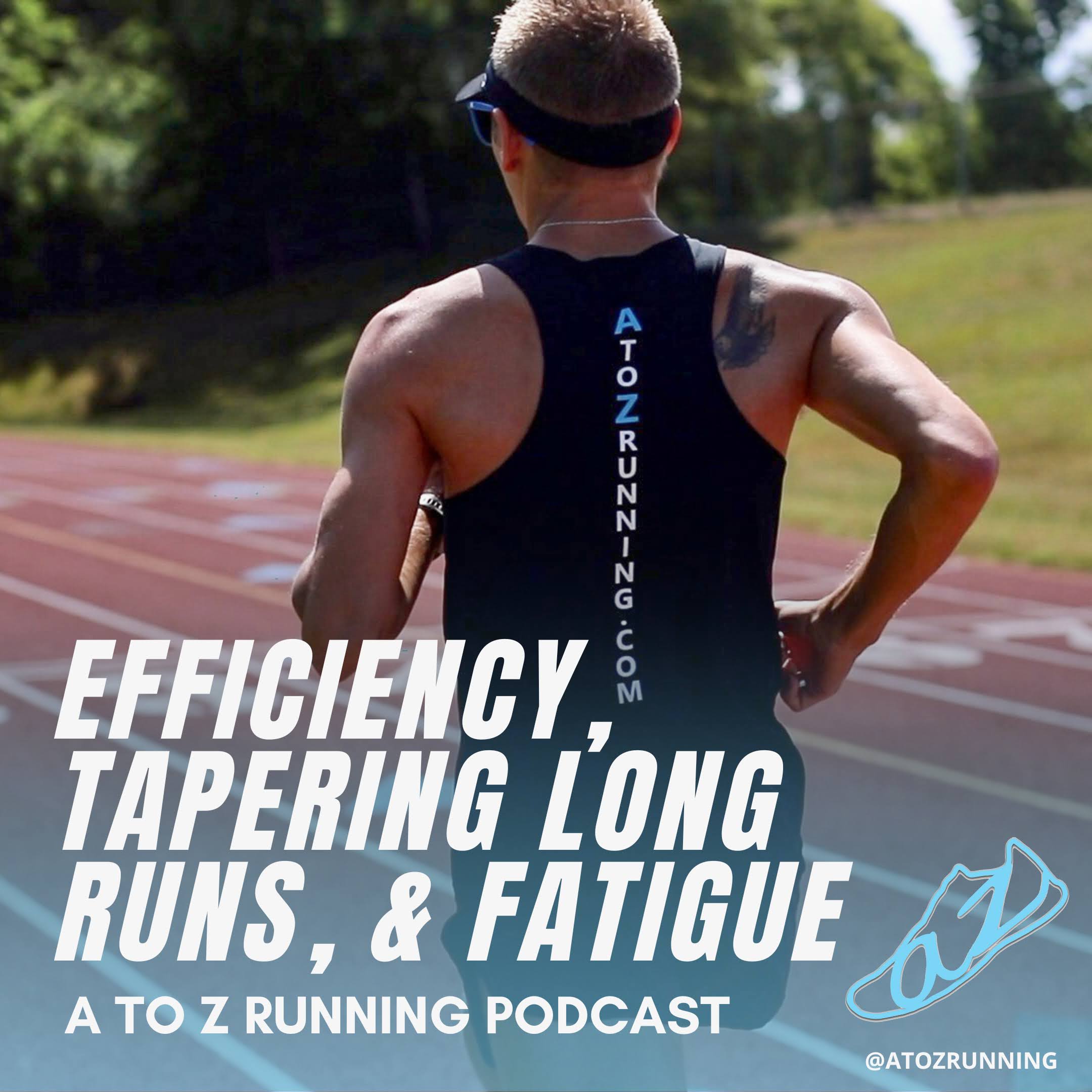LISTEN
In this episode of the A to Z Running Podcast, Zach and Andi and listener Q & A about efficiency, tapering long runs, and fatigue.
Stick around after that for the latest from the world of running.
INTRO
-
-
- FOLLOW and SUBSCRIBE
- Thanks for joining in on the conversation on social media. Please say hello if you see us at races!
- Ask a question!
-
MAIN TOPIC: EFFICIENCY, TAPERING LONG RUNS, & FATIGUE
Today’s episode comes from questions you’ve sent into A to Z Running!
From Paul
In a summer 10k race would heat & humidity create the need for mid race hydration? Maybe in someone who sweats heavily? People running over 60 min? The women’s USA 10k Olympic Qualifying race was rescheduled for the danger of heat. What would determine if grabbing water on the run is worth it?
- Short answer: If you are well hydrated, you shouldn’t need hydration for a race less than an hour. If you run over an hour, you will want to plan to hydrate.
- You do not need to plan to hydrate, only drink if you feel thirst.
- That being said, on a hot and humid day, you may want the water for your dry mouth or pour it on your body to help pull heat away from your skin.
- Temperature regulation is the key conversation here. If you feel you need a drink, do it!
American College of Sports Medicine Position Stand: Exercise and Fluid Replacement
- Hydration is crucial in the entire 24hr period leading up to your race. Be sure to include sodium, potassium, magnesium and calcium into your meals or electrolyte drinks.
- Drink over 16 ounces 2hrs before the event. Water ingested 60 min before exercise will enhance thermoregulation and lower heart rate during exercise.
- Carbohydrates and/or electrolytes to a fluid replacement solution is recommended for exercise events of duration greater than 1hr since it does not significantly impair water delivery to the body and may enhance performance.
- During exercise lasting less than 1hr, there is little evidence of physiological or physical performance differences between consuming a carbohydrate-electrolyte drink and plain water.
- Temperature regulation and hydration go hand in hand.
- Disruption to body water and electrolyte balance can hurt your body at a cellular level as well as systemic function. This means that runners will have a decrease in performance in distance races. Even a small amount of dehydration (1% body weight) can increase cardiovascular strain (increase your heart rate), and limit the ability of the body to transfer heat from contracting muscles to the skin surface where heat can be dissipated to the environment.
From Marc:
Me again, I am full of questions. I have been training again for a 1/2 marathon in September after my first marathon in May. I really try to run the easy days easy (and slow, 9:30-10/min mile). I have been dealing off and on with a sore hip joint on the right side. I have been stretching, dynamic warm up, strength training, PT, etc and it has been kind of an annoyance for about the last year or so. There are days when it is a little sore at the start (maybe a 1 on the pain scale) and then goes away and other days it can be there the entire run (1-2 on the pain scale). Through journaling my runs over the past 8 months I have noticed that it seems to be better (or occurs less) when I am doing more speed work or tempo type runs (higher effort). The last couple weeks I have been testing this theory by running my easy runs at a pace closer to 9:00/min pace and it seems to make a difference. I feel like a 9:00 pace is still pretty easy for me, I can still talk if running with someone, but is this too fast (too much effort). Data shows that during previous easy runs my HR would average about 130-134 and at the faster pace it is in the 136-140 range. I know this is not the best measure, but does seem to track fairly well.
So my question: have you heard of this type of an issue when running easy due to maybe a persons form or stride length? I just get nervous that my easy runs may not be easy enough if I speed them up even though it feels better. I know you are not a doctor, but just curious your thoughts and experience on this subject.
- Marc, you know us too well! You caveated away all our caveats… so we can skip them!
- First, it is very possible that different positions at impact and different stride mechanics can affect things in different ways
- Question: when you say it is better when you’re doing those harder efforts, do you mean better on those runs only or better for all runs when you’re doing more of those in general?
- Key consideration: if it is a less efficient or effective stride mechanic, work on that (not by effort changes but by mechanical improvements)
- If that doesn’t help, it could be structural (hence the issue with certain positions, etc.)
- Best suggestion: video yourself at 3 or 4 levels of effort: very easy/jog; easy; strong steady; very fast
- That might provide insight into what you are doing mechanically (if that is related)
- At higher speeds, we tend toward more efficient running (for a well-trained runner)
Anonymous:
My question is this…the plan I’m following has me doing my longest run before taper starts 3 weeks before which is Ragnar Weekend. I’ll get the miles, just not in one run. However, this plan also has two long runs at that mileage in week 12 and 13. Is that too early to do the “last” longest run before the day?
My goal is simply to finish in under 5 hours since it took me more than that last year.
When should you cut back your long runs before a marathon? Does it serve the same purpose if you split it up?
Answer: You can run long runs up to two weeks before your marathon. Splitting up your long run in a long relay like the Ragner does not serve the same purpose as a long run. However, you should not try to over-exert on the weekend by adding more miles with the lack of sleep and extra running you are going to be doing. Better wait until the next weekend to do the long run.
Anonymous question
Context: finished a marathon (great season, healthy, executed a better than goal effort); now getting ready for another long race (two months later)
Feeling lethargic and fatigued, took some down time, still lethargic and fatigued.
Doing especially long long-runs on trails to handle the next race.
- Could be hydration/sleep/nutrition
- Could be lack of recovery/overtraining on the long stuff (esp trails)
- Could be need for different stimulation, neuromuscular change
WORLD OF RUNNING
World of Running
- AtoZrunner updates
Bill 5k 2nd overall
Jax 5k 4th overall
Julie half marathon 2nd AG
Mark half marathon 3rd AG
Andrew half marathon 3rd AG
Kristi near PR at the CRIM 10mi
Chadd tied for 2nd at the Backyard Squatch Ultra: 4.166667 miles every hour on the hour. He went 100 miles!
#1. Alicia Monson on the rise
- American Alicia Monson almost stunned the world by winning the women’s 3,000 meters but was ultimately edged at the last second by Francine Niyonsaba, 8:26.60 to 8:26.61, as Niyonsaba leaned at the line and Monson did not.
- Alicia ran the second fastest time in US history to Mary Slaney who set the record back in 1985
- 1) Mary Slaney, 1985- 8:25.83
- 2) Alicia Monson, 2022- 8:26.81
- 3) Jenny Simpson, 2014- 8:29.58
- 4) Shannon Rowbury, 2014- 8:29.93
- 5) Elise Cranny, 2022- 8:29.95
- 6) Kara Goucher, 2007- 8:34.99
- 7) Libbie Johnson-Hickman, 2000- 8:35.02
- 8) Jennifer Rhines, 2007- 8:35.03
- 9) Shalane Flanagan, 2007- 8:35.34
- 10) Vicki Huber, 1988- 8:37.25
Related: Alicia Monson on the A to Z Running Podcast
#2. Ultra-Trail du Mont-Blanc
- It has a distance of approximately 171 k (106 mi), and a total elevation gain of around 10,040 m (32,940 ft). It is widely regarded as one of the most difficult foot races in the world, and one of the largest with more than 2,500 starters.
- Starting and ending in Chamonix, France, goe through both Italy and Switzerland
- Kilian Jornet won and ran a course record of 19 hours, 49 minutes.
- He is a six-time champion of the long-distance running Skyrunner World Series.
- Jornet holds the fastest known time speed record for the ascent and descent of major mountains including the Matterhorn and Mont Blanc.
- He also previously held speed records for Aconcagua, Denali, and Kilimanjaro, all of which were eventually broken by Karl Egloff.
- In addition, he holds the 24-hour uphill skiing record: 23,864-meters (78,274 ft). This achievement was set on 8 February 2019.
- Women’s winner was Katie Schide. In an interview with irunfar, Katie talks about how she runs by feel, not by time.
- This year alone Katie has won both the Val d’Aran By UTMB – 100k and Maxi Race Marathon
#3. Interesting things preluding fall marathons…
LONDON:
- Yalemzerf Yehualaw (Ethiopia) ran fast at Antrim Coast half… (64:22 after opening in 14:44 and 29:52)
- Source: Athletics Weekly
- She will be running London Marathon (6th all-tiem) along with Brigid Kosgei (Kenya, WR), Joyciline Jepkosgei (Kenya, 8th all-time)
- Eilish McColgan will also be making her marathon debut there
- For the men, Kenenisa Bekele (Ethiopia, 2nd all-time), Birhanu Legese (Ethiopia, 3rd all-time), Mosinet Geremew (Ethiopia, 4th all-time), Sisay Lemma (Ethiopia, defending champ, 14th all-time), Kengo Suzuki (Japanese national record), Sir Mo Farah (British record)
BERLIN:
- US star Keira D’Amato tops the entry list for Berlin Marathon that includes Nancy Jelagat Meto (Kenya) and Sara Hall (USA)
- For the men: Eliud Kipchoge (Kenya, WR) rematch with Guye Adola (Ethiopia)
CHICAGO:
- Ruth Chepngetich (Kenya, 4th all-time)
NEW YORK:
- Peres Jepchirchir (Kenya, 5th all-time), Lonah Chemtai Salpeter (Israel, 9th all-time), and Gotytom Gebreslase (Ethiopia, 9th all-time, defending world champ), and Edna Kiplagat (Kenya, mult-time majors champ); Sara Hall and Des Linden; Hellen Obiri (Kenya, champ) making debut
- Evans Chebet (Kenya, 7th all-time), Daniel Do Nascimento (Brazil, national record), Abdi Nageeye (Netherlands, national record), Galen Rupp (USA)
Interested in a training plan and/or coaching? We offer personalized support to help you achieve your goals! KEEP LISTENING




Leave a Reply
Want to join the discussion?Feel free to contribute!